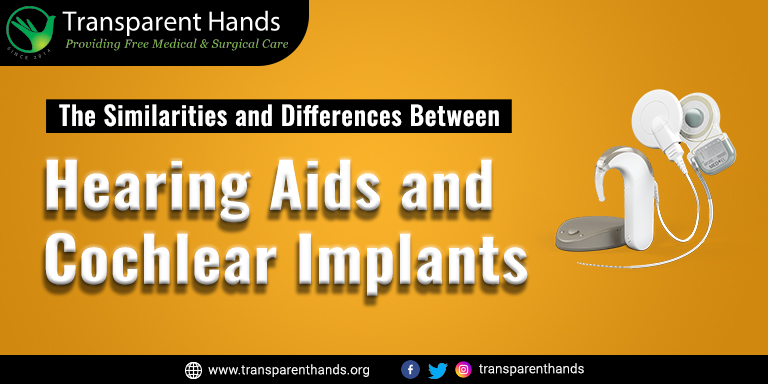Similarities and Differences Between Hearing Aids and Cochlear Implants

Hearing loss is the inability to hear sounds in one or both ears, either partially or completely. It can happen at any age and can be temporary or permanent. Hearing loss can range from a mild inability to hear certain sounds to a complete loss of hearing.
Hearing loss is a common condition that affects millions of people worldwide. For those who experience hearing loss, there are two primary solutions available: hearing aids and cochlear implants. Both of these devices aim to improve hearing ability, but they work in different ways and are suitable for different types of hearing loss. In this article, we will explore the similarities and differences between hearing aids vs cochlear implants, and discuss how they can improve the lives of people with hearing loss.
Types of Hearing Loss
There are three main types of hearing loss:
- Conductive hearing loss: It occurs when sound waves cannot reach the inner ear due to obstruction or impediment. This can be caused by ear infections, a buildup of earwax, or damage to the eardrum or bones of the middle ear.
- Sensorineural hearing loss: This type of hearing loss occurs when the inner ear or auditory nerve is damaged. It can be caused by aging, noise exposure, certain medications, or genetic factors.
- Mixed hearing loss: It is a combination of conductive and sensorineural hearing loss that occurs when both the outer or middle ear and the inner ear are damaged.
Hearing loss can have a significant impact on a person’s quality of life, affecting their ability to communicate, socialize, and perform daily activities. Early detection and treatment are critical for managing hearing loss and preventing further deterioration. Depending on the severity and type of hearing loss, treatment options include hearing aids, cochlear implants, and other assistive listening devices.
The decision to use hearing aids or cochlear implants for hearing loss depends on the severity and type of hearing loss, as well as individual preferences and needs. Here’s a brief overview of when and why each device is typically recommended:
Hearing Aids
Hearing aids are generally recommended for people who have mild to moderate hearing loss. They work by amplifying sound, making it more audible and louder. Hearing aids are worn externally and are available in a range of designs and features to accommodate a variety of preferences and needs.
Cochlear Implants
Cochlear implants are recommended for people who have severe to profound hearing loss and do not benefit from hearing aids. They work by directly stimulating the auditory nerve rather than bypassing damaged parts of the inner ear. Cochlear implants are a costly procedure that requires surgery to surgically implant the device into the inner ear.
Similarities:
- Both improve hearing: The primary function of both hearing aids and cochlear implants is to improve hearing. They do this by amplifying sound or bypassing damaged parts of the ear to stimulate the auditory nerve.
- Both require fitting and adjustment: To get the best results from a hearing aid or cochlear implant, it must be fitted and adjusted to the individual’s specific hearing needs.
- Both require maintenance and care: Regular maintenance and care are essential to keep hearing aids and cochlear implants functioning correctly and to prevent damage or malfunctions.
Differences:
- Working mechanism: Hearing aids amplify sound, making it louder for people with hearing loss. Cochlear implants, on the other hand, bypass damaged parts of the inner ear and directly stimulate the auditory nerve, allowing people with severe hearing loss to hear more clearly.
- Type of hearing loss: Hearing aids are typically used for people with mild to moderate hearing loss, while cochlear implants are recommended for people with severe to profound hearing loss.
- Cost: Hearing aids are generally less expensive than cochlear implants. However, the cost of both devices varies depending on the type and features.
- Implantation: Hearing aids are worn externally, while cochlear implants require surgery to implant the device into the inner ear.
- Battery life: Hearing aids typically use disposable or rechargeable batteries, while cochlear implants have an internal battery that needs to be surgically replaced every few years.
- Learning curve: Learning to use a hearing aid is typically easier than learning to use a cochlear implant. This is because hearing aids amplify sound, which is familiar to most people, while cochlear implants provide a different type of hearing sensation.
- Speech perception: Cochlear implants generally provide better speech perception in noisy environments than hearing aids.
Donate For Cochlear Implant Surgeries
That is all about hearing aids vs cochlear implants for now. Hopefully, the information provided in the article is helpful to you. One thing we need to keep in mind is that we should never overlook or ignore hearing loss, no matter if it is temporary or mild. The issue may worsen if ignored, which is why you should ensure that the patient is properly examined by the experts and treated accordingly.
Must Read:










Leave a Reply